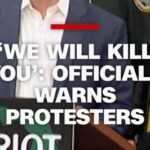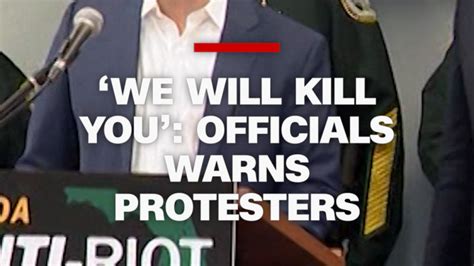
Missouri Governor Mike Parson activated the National Guard and declared a state of emergency on Wednesday in anticipation of potential unrest following a verdict in the case of a St. Louis police officer accused of shooting and killing a Black suspect in 2011.
JEFFERSON CITY, Mo. – Missouri Governor Mike Parson activated the Missouri National Guard and declared a state of emergency on Wednesday, July 12, 2023, citing concerns over potential civil unrest following the impending verdict in the case of a white St. Louis police officer, Jason Stockley, who is accused of fatally shooting a Black suspect, Anthony Lamar Smith, in 2011.
Parson’s executive order allows the National Guard to assist local law enforcement agencies in maintaining order and protecting property should protests turn violent. The decision comes as St. Louis prepares for potential demonstrations, regardless of the outcome of Stockley’s bench trial.
“As governor, I am responsible for ensuring the safety of all Missourians,” Parson stated in a press release. “Activating the National Guard is a proactive step to ensure we are prepared to respond to any situation that may arise. We are committed to protecting the rights of peaceful protesters while also ensuring the safety of our communities.”
The move echoes a similar action taken in 2017 when the Stockley verdict was initially delivered. At that time, protests erupted in St. Louis, resulting in property damage and confrontations between demonstrators and law enforcement. Stockley was acquitted of first-degree murder in that trial, sparking widespread outrage and renewed calls for police accountability.
“We respect the right of people to peacefully protest, but we will not tolerate violence or destruction of property,” Parson emphasized. “Our goal is to ensure that everyone can exercise their First Amendment rights in a safe and responsible manner.”
The state of emergency declaration enables the governor to mobilize state resources, including the National Guard, to assist local authorities in maintaining peace and order. It also allows for increased coordination between state and local law enforcement agencies.
The decision to activate the National Guard has drawn mixed reactions. Some community leaders have expressed support for the measure, arguing that it is necessary to prevent violence and protect businesses. Others have criticized the move, claiming that it is an overreaction that could escalate tensions and suppress peaceful protest.
“We understand the need to prepare for potential unrest, but we also believe that it is important to respect the rights of protesters,” said Reverend Al Sharpton in a released statement from his organization. “We urge state and local officials to exercise restraint and to avoid using excessive force against demonstrators.”
St. Louis Mayor Tishaura Jones issued a statement acknowledging the governor’s decision, emphasizing the city’s commitment to protecting both public safety and the right to protest. “The City of St. Louis is committed to protecting the First Amendment rights of our residents while also ensuring the safety and security of our community,” Jones stated. “We are working closely with state and local partners to prepare for any potential outcome of the Stockley case.”
The Stockley case has been a source of deep division and controversy in St. Louis for years. Anthony Lamar Smith, a 24-year-old Black man, was shot and killed by Stockley, who is white, following a high-speed chase in December 2011. Stockley claimed that he shot Smith in self-defense after Smith reached for a gun. Prosecutors, however, argued that Stockley planted the gun in Smith’s car after the shooting.
The initial acquittal of Stockley in 2017 led to weeks of protests and civil unrest in St. Louis, with demonstrators marching through the streets, blocking traffic, and clashing with police. More than 100 people were arrested during the protests.
The decision to retry Stockley stems from a lawsuit brought by Smith’s family, alleging that Stockley used excessive force. The lawsuit argued that Stockley’s actions violated Smith’s civil rights.
The current bench trial, presided over by a judge without a jury, has been closely watched by the St. Louis community. The verdict is expected to be delivered soon, and many fear that it could spark renewed protests and unrest, regardless of the outcome.
The activation of the National Guard and the declaration of a state of emergency reflect the high level of concern among state and local officials about the potential for violence and disruption in the wake of the Stockley verdict. The move underscores the ongoing tensions and divisions surrounding issues of race, policing, and justice in St. Louis and across the United States.
In preparation for potential unrest, the St. Louis Metropolitan Police Department has increased its presence in key areas of the city, including downtown, the Delmar Loop, and the Central West End. The department has also deployed additional officers to monitor protests and respond to any incidents of violence or property damage.
“We are prepared to respond to any situation that may arise,” said Police Chief Robert Tracy during a press conference. “Our priority is to protect the safety of our residents and to ensure that everyone can exercise their rights in a peaceful and responsible manner.”
Local community organizations have also been working to de-escalate tensions and promote peaceful dialogue. Several groups have organized community meetings and forums to discuss the Stockley case and its implications for the St. Louis community.
“We believe that it is important to create spaces for people to come together and talk about these issues,” said one community leader. “We need to listen to each other and work together to build a more just and equitable society.”
The situation in St. Louis remains tense as the city awaits the verdict in the Stockley case. The activation of the National Guard and the declaration of a state of emergency serve as a reminder of the potential for unrest and the need for continued dialogue and understanding.
Background and Context:
The case of Jason Stockley and the death of Anthony Lamar Smith is deeply rooted in the history of racial tensions and police misconduct in St. Louis. The city has a long history of racial segregation and discrimination, which has contributed to deep-seated distrust between the Black community and law enforcement.
The shooting of Anthony Lamar Smith occurred in the context of a broader national debate about police brutality and racial profiling. In the years leading up to the Stockley case, several high-profile incidents of police violence against Black men and women had sparked protests and calls for police reform across the country.
The Stockley case became a flashpoint for these broader concerns in St. Louis. The initial acquittal of Stockley in 2017 was seen by many as evidence of a systemic lack of accountability for police officers who use excessive force against Black people.
The protests that followed the acquittal were largely peaceful, but they were also met with a strong police response. Demonstrators were often met with tear gas, pepper spray, and rubber bullets, leading to accusations of police brutality.
The Stockley case has had a lasting impact on the St. Louis community. It has deepened divisions and heightened tensions between the Black community and law enforcement. It has also sparked renewed calls for police reform and accountability.
The decision to retry Stockley reflects a growing recognition of the need to address these issues. It is an attempt to provide justice for Anthony Lamar Smith and his family, and to hold police officers accountable for their actions.
However, the outcome of the current trial remains uncertain. Regardless of the verdict, it is likely that the Stockley case will continue to be a source of controversy and division in St. Louis for years to come.
Potential Scenarios and Implications:
The potential scenarios following the Stockley verdict are varied and complex. Here’s a breakdown of possible outcomes and their potential implications:
-
Scenario 1: Stockley is Found Guilty:
- Implications: While a guilty verdict may bring a sense of justice to the Smith family and some members of the community, it could also lead to backlash from Stockley’s supporters and some law enforcement officers. Protests may still occur, though they might be smaller and less intense than if he’s acquitted. The focus would likely shift to the sentencing phase, with debates about the appropriate punishment for Stockley.
- Community Response: A sense of relief and vindication among those who believe Stockley acted wrongly. However, some may remain skeptical, feeling that the justice system is still flawed.
- Law Enforcement Response: Potential for demoralization among some officers who may feel Stockley was unfairly targeted. Concerns about the potential for a chilling effect on proactive policing.
-
Scenario 2: Stockley is Found Not Guilty:
- Implications: This is the scenario that officials seem most concerned about. A not-guilty verdict would likely trigger widespread protests and civil unrest, potentially on a larger scale than in 2017. Demonstrators would likely view the verdict as a clear example of racial bias in the justice system.
- Community Response: Outrage, anger, and a sense of betrayal among many in the Black community and their allies. Increased calls for police reform and accountability.
- Law Enforcement Response: Heightened alert and readiness to respond to protests. Increased scrutiny of police tactics and potential for clashes with demonstrators.
-
Scenario 3: A Hung Jury or Mistrial:
- Implications: This outcome would likely lead to continued uncertainty and frustration. Protests could still occur, although the intensity might be lower than in the event of an acquittal. The case could be retried, leading to further legal battles and community unrest.
- Community Response: Disappointment and a sense of injustice. Calls for the prosecutor to retry the case.
- Law Enforcement Response: Continued monitoring of the situation and preparation for potential protests. Uncertainty about the future of the case and its impact on community relations.
Role of the National Guard:
The activation of the National Guard is intended to serve several purposes:
- Reinforcement of Local Law Enforcement: The National Guard can provide additional personnel and resources to support local police departments in maintaining order and responding to potential unrest.
- Protection of Critical Infrastructure: The National Guard can be deployed to protect key infrastructure, such as government buildings, hospitals, and utilities, from damage or disruption.
- Crowd Control: The National Guard can assist with crowd control and the management of protests, helping to prevent violence and property damage.
- Deterrence: The presence of the National Guard can serve as a deterrent to those who may be considering engaging in violence or criminal activity.
Concerns about Militarization:
Despite the intended benefits, the deployment of the National Guard also raises concerns about the militarization of policing and the potential for excessive force. Critics argue that the presence of heavily armed soldiers can escalate tensions and create a climate of fear, particularly in communities that already have strained relationships with law enforcement.
Alternative Approaches:
Some community leaders and activists have called for alternative approaches to addressing the potential for unrest, such as:
- Community Dialogue: Promoting open and honest conversations between law enforcement, community leaders, and residents to address concerns and build trust.
- De-escalation Training: Providing law enforcement officers with training in de-escalation techniques to help them manage protests and avoid the use of excessive force.
- Transparency and Accountability: Increasing transparency in police investigations and holding officers accountable for misconduct.
- Investment in Community Resources: Investing in community programs and resources that address the root causes of crime and violence, such as poverty, unemployment, and lack of access to education and healthcare.
Long-Term Solutions:
The Stockley case highlights the need for long-term solutions to address the underlying issues of racial inequality, police brutality, and lack of trust in the justice system. These solutions must involve a comprehensive approach that includes police reform, community investment, and a commitment to racial justice.
Frequently Asked Questions (FAQ):
Q1: Why did Governor Parson activate the National Guard?
A: Governor Parson activated the National Guard and declared a state of emergency due to concerns about potential civil unrest following the impending verdict in the case of Jason Stockley, a former St. Louis police officer, accused of fatally shooting Anthony Lamar Smith in 2011. The Governor stated the activation was a proactive step to ensure the safety of all Missourians and protect the rights of peaceful protesters while preventing violence and destruction of property.
Q2: What are the potential scenarios after the verdict is announced?
A: There are three primary potential scenarios:
- Guilty Verdict: May bring a sense of justice but could also lead to backlash from Stockley’s supporters.
- Not Guilty Verdict: Could trigger widespread protests and civil unrest, potentially on a larger scale than in 2017.
- Hung Jury or Mistrial: Would likely lead to continued uncertainty and frustration, with the possibility of a retrial and further unrest.
Q3: What will the National Guard do in St. Louis?
A: The National Guard is authorized to assist local law enforcement in several ways, including:
- Reinforcing local police departments.
- Protecting critical infrastructure.
- Assisting with crowd control.
- Acting as a deterrent to potential violence.
Q4: What are the criticisms of activating the National Guard?
A: Critics argue that deploying the National Guard can escalate tensions and create a climate of fear, particularly in communities with strained relationships with law enforcement. They express concerns about the militarization of policing and the potential for excessive force.
Q5: What alternatives have been suggested to address potential unrest?
A: Community leaders and activists have suggested alternatives such as:
- Promoting community dialogue between law enforcement and residents.
- Providing de-escalation training for police officers.
- Increasing transparency and accountability in police investigations.
- Investing in community resources to address the root causes of crime and violence.
Impact on the St. Louis Community:
The Stockley case has deeply affected the St. Louis community, exacerbating existing tensions related to race, policing, and justice. The activation of the National Guard adds another layer of complexity to an already fraught situation.
Increased Anxiety and Fear:
The presence of the National Guard can increase anxiety and fear among residents, particularly in Black communities that have historically experienced negative interactions with law enforcement. The sight of heavily armed soldiers can be intimidating and can create a sense of unease.
Potential for Escalation:
The deployment of the National Guard also carries the risk of escalating tensions and provoking violence. If protesters perceive the National Guard as an occupying force, they may be more likely to confront them, leading to clashes and potential injuries.
Erosion of Trust:
The activation of the National Guard can further erode trust between the community and law enforcement. If residents feel that the authorities are overreacting or using excessive force, they may be less likely to cooperate with police in the future.
Need for De-escalation and Dialogue:
Given these potential risks, it is essential for state and local officials to prioritize de-escalation and dialogue. They should work to engage with community leaders, listen to their concerns, and find ways to address their grievances.
Promoting Peaceful Protest:
Officials should also respect the right of people to peacefully protest. They should ensure that protesters have a safe space to express their views and that law enforcement officers are trained to manage protests in a non-violent manner.
Addressing Systemic Issues:
Ultimately, the Stockley case is a symptom of deeper systemic issues related to racial inequality, police brutality, and lack of trust in the justice system. To address these issues, it is necessary to implement comprehensive reforms that promote fairness, accountability, and justice for all.
Looking Ahead:
The coming days and weeks will be a critical period for St. Louis. The outcome of the Stockley case will have a significant impact on the community, and it is essential for all stakeholders to work together to ensure that the city can move forward in a peaceful and productive manner.
The activation of the National Guard is a reminder of the challenges that remain in addressing racial inequality and police brutality in the United States. It is a call for action to create a more just and equitable society for all.









